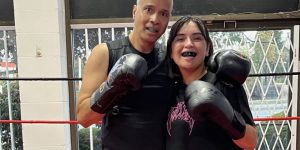When I step through the doors of Dragon’s Den Elite Combat Sports, the first thing I do is take off my shoes. In a facility founded on respect, I wouldn’t dare to mar the red and blue mats with street shoes, even when not training. Above me, shelves stretching to the tall ceilings hold golden medals, shiny trophies, and championship belts. Across the room, black punching bags are hanging in neat rows, grappling dummies are piled to the side, and in the corner, a full boxing ring stares me down. Every aspect of this gym is a testament to its 35 years of training fighters, and the man who built it from the ground up.
He goes by Master Stephen Lapre. To me, he is Coach. An Indonesian-Filipino fighter through and through, he is trained in more combat styles than I can name. Though he’s passed his time of competing, Coach remains just as fit as the fighters he trains. He stands tall and confident while he surveys a class full of students running laps around the parking lot.
Coach’s journey in martial arts started at the age of six. His father, a martialist, taught private lessons in the garage of their family home. Through a small slit in the door, a younger Stephen would peer through once he was tall enough, intently watching older fighters. He observed intensive training and black eyes. As the eldest son, it was his duty to carry on the legacy of his father’s teachings - a responsibility that would shape the rest of his life.
By the age of eight, Stephen was already immersed in several martial arts styles under his father and other coaches, only increasing in variety as he aged. It wasn’t long before he began teaching his own private lessons. He taught out of students’ homes before securing his first temporary location - an unused racquetball court in his strata. This is where Dragon’s Den was born.
He started out teaching tae kwon do, the most popular combat sport at the time. It was not long before Dragon’s Den grew to have a permanent, indoor location. Here, he incorporated a more diverse repertoire of training, with influences from his background in Filipino martial arts. The mission of Dragon’s Den became “street first, sport second.” Many students have gone on to win provincial and national titles, but Stephen also speaks proudly of the ones who have used their training for occupational purposes, in policing, military, and border services. Once, I asked him what the best martial art was. He pulled a pocket knife out of the belt loop of his jeans. Street first, sport second.
That’s one of the many philosophies that Coach Stephen teaches. The most important one, though, is two words painted onto a small wooden sign in red: FIGHT ON. It shines through when I ask about his most memorable moment. “The newspaper article is on the desk over there. I remember him like it was yesterday.” He tells me the story of a troubled teen battling anger issues who used MMA as an outlet to turn his life around, earning his first ring match at just 16 with only a year of training. I can’t help but feel reminded of my own experience.
I joined Dragon’s Den during one of the lowest points in my life. With little athletic ability and even less martial arts experience, I struggled through my first classes. The movements were foreign, and exhausting. And Coach isn’t very good with names. He could never remember that my name was Bryna, so I started going by Bryn at the gym. Bryn was easier to pronounce. I thought that I didn’t belong, and maybe I should quit, until one class, Coach Stephen gave us a talk.
“Everyone here is a fighter. Everyone here is fighting something.” He looked around at the assorted group sitting on the mats - parents, teens, students, all covered in sweat and shin bruises. “Every day that you get up, you’re in a fight. If you draw breath, you’ve got another round to go. You train here because it gives you that mental tenacity. That self-discipline. It’s not all about the combat because quite honestly, it's not the fight within the sport itself that you should be focusing on. It's that daily battle that's outside this facility that you need to encompass yourself with.”
I grew to like being Bryn. Bryn is a fighter.
In a style inspired by his father, Coach Stephen doesn’t extol training; he is the epitome of tough love. It took over a month of consistent training before I heard my first ‘good job’. When I spar with Coach, he corrects my technique. He jabs me in the face every time I let my guard down, hard enough that I see red, but never enough to hurt. He could knock me out clean if he wanted to, but he doesn’t. He is teaching me a lesson. I need to breathe, I need to stay focused, I need to keep my control. Coach knows my biggest weakness is my temper, and he is testing it. Kickboxing taught me better emotional regulation than therapy ever did.
When I come back to visit, Coach always asks about my family and how school is going. Even now that I am no longer his student, he never stops coaching me. Every conversation is another lesson. “You get knocked down, you just keep on going. No matter how many times you get knocked down. Because the minute you stop and you don't get up, you've lost. And a loss is a loss. As long as you maintain those two words every day, you fight on.”
